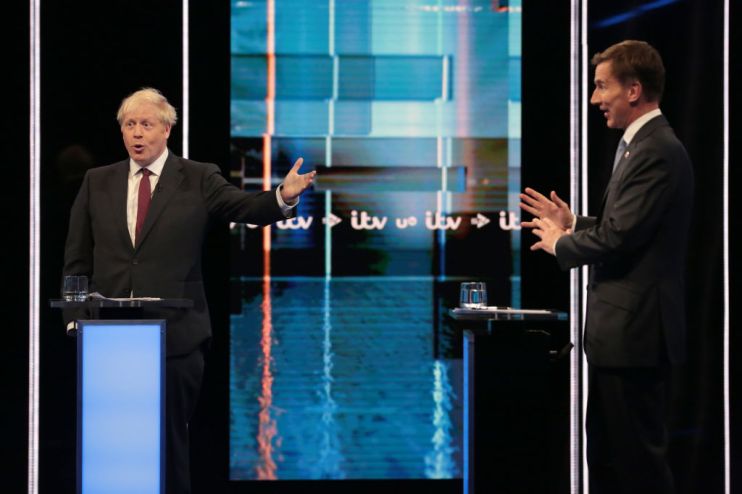Sterling hits new two-year low as no-deal Brexit risk jumps

The pound tumbled to fresh two-year lows against the dollar today after the two candidates to replace Theresa May pledged to abandon the controversial Northern Ireland backstop proposals, ramping up the chances of a no-deal Brexit.
Read more: Amber Rudd: I won’t lie down in front of bulldozers to stop no-deal Brexit
Boris Johnson and Jeremy Hunt have both said they will ditch the backstop, a key part of May’s Brexit deal designed to stop a hard border returning to the island of Ireland, even if the EU proposed a time limit to it.
Johnson and Hunt’s statements during a debate on Monday night were seen by traders as increasing the risk of a clash with Brussels and a turbulent no-deal outcome.
Sterling had dropped 0.8 per cent against the greenback to $1.241 by 6.30pm UK time, even falling below the level reached in a so-called flash crash at the start of the year. It had fallen 0.4 per cent to a six-month low against the euro of €1.107.
It was dragged down further by reports that Johnson, front-runner to become the next prime minister, is considering shutting down parliament at the end of October to stop MPs blocking a no-deal Brexit.
According to Sky News, Johnson would schedule a Queen’s Speech for the beginning of November. MPs are traditionally sent home for up to a fortnight before the speech, meaning they would not be in session to block a no-deal Brexit on 31 October.
Senior Remain-backing Tories are now openly flirting with the prospect of voting against the government in a confidence motion, something former attorney general Dominic Grieve said he would do “with a heavy heart.”
Brexit-induced falls mean the pound has now been the worst performing currency against the dollar over the past year. Even yesterday’s release of better-than-expected wage growth figures could not arrest the pound’s fall.
Investec chief economist Philip Shaw said the falling pound was “an indication that in terms of currency drivers, domestic fundamentals have once again begun to give way to Brexit issues”.
Craig Erlam, senior market analyst at foreign exchange company Oanda, said: “Traders are finding it hard to look past no-deal risks or at the very least a delay and hard Brexit.”
Traders have been dumping sterling as the chances of a no-deal Brexit have risen in recent weeks. Johnson has said he will take Britain out of the EU on 31 October “come what may”.
Read more: FTSE 100 chairs predict further Brexit extension
The pound has fallen one per cent against the dollar over the last month. This is despite it being a period of considerable dollar weakness caused by the US Federal Reserve’s hints that it will cut interest rates.